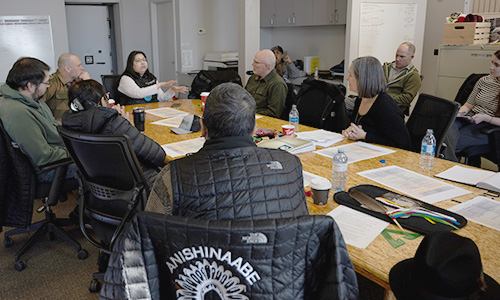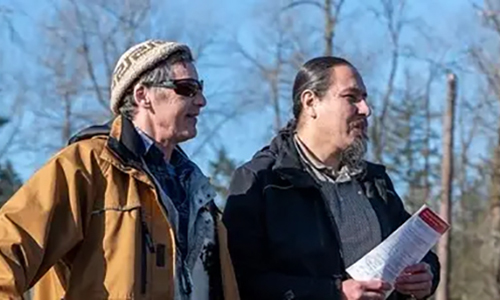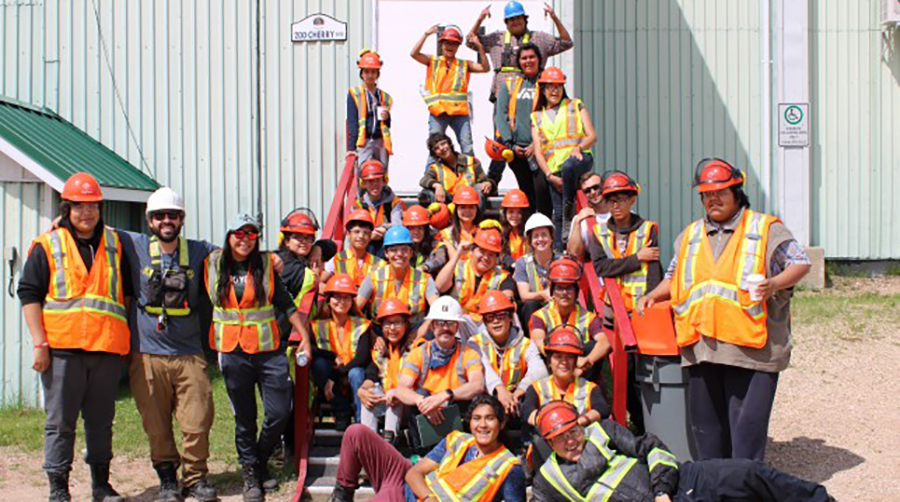EXPLORE SFI RESOURCES FOR INDIGENOUS COMMUNITIES AND BUSINESSES
SFI is committed to building and promoting forest-focused collaborations rooted in recognition and respect for Indigenous Peoples’ rights and traditional knowledge.
We recognize that Indigenous Peoples are essential partners in any forest-focused collaboration and that their full participation will better enable us to collectively advance forest sustainability. Together, we can create a world that values and benefits from sustainably managed forests.
Learn more about SFI’s commitment to advance respectful, forest-focused collaboration rooted in recognition and respect for Indigenous Peoples’ rights and traditional knowledge.
Explore an interactive map featuring all Indigenous communities and Indigenous-led businesses that have leveraged SFI programs to achieve their goals (grey dots), as well as map highlights (brightly colored dots) with examples of how select Indigenous communities have partnered with SFI.
Explore the programs and products SFI offers Indigenous communities and Indigenous-led businesses:
SFI STANDARDS & INDIGENOUS COMMUNITIES
- SFI Forest Management Standard
- SFI Small-Scale Forest Management Module for Indigenous Peoples and Families
- SFI Urban and Community Forest Sustainability Standard
- Which SFI Standard is Right for Our Forest?
- Community
- Conservation
- Education
- Additional Resources
- Mentorship
- Voices Of Indigenous Youth In Green Jobs Map
- Wage Matching For Indigenous Youth
SFI STANDARDS & INDIGENOUS COMMUNITIES
There are many benefits to SFI certification. SFI is North America’s largest independent, third-party forest certification standard, and by certifying your forest to a SFI Standard, you are joining a growing community that’s dedicated to advancing sustainability through forest-focused collaboration. Explore the key differences between the three certification Standards and how they support different areas of focus for improved Indigenous Relations and increased Indigenous sovereignty.
The SFI 2002 Forest Management Standard promotes sustainable forestry practices based on 13 Principles, 17 Objectives, 41 Performance Measures and 141 Indicators. Among its requirements are measures to protect water quality, biodiversity, wildlife habitat, species at risk, forests with exceptional conservation value, and recognize and respect Indigenous Peoples’ rights. This standard is for land managers or owners who manage over 20,000 hectares of forestland.
The SFI Small-Scale Forest Management Module for Indigenous Peoples and Families supports Indigenous communities who own or manage under 20,000 hectares of forestland. This standard is based on the SFI 2002 Forest Management Standard but is scaled for smaller land sizes.
The SFI Urban and Community Forest Sustainability Standard was recently created in support of increasing the resiliency and sustainability of Indigenous communities by using trees, forests, green infrastructure, and natural solutions.
SFI can provide Indigenous communities and businesses with funding and in-kind certification readiness support to achieve a successful third-party forest certification audit. Contact Indigenous.Relations@forests.org to learn more.
VALUES-DRIVEN CERTIFICATION STANDARDS
- conservation of biodiversity
- water quality and protection
- respect for Indigenous peoples’ rights
- protection of cultural sites
- forest health and productivity
- recreation and visual quality
- community outreach and involvement
- continuous improvement
BENEFITS OF SFI CERTIFICATION
- Greater market access through SFI-certified mills and supply chains.
- Enhanced credibility through independent third-party audits and measurable indicators.
- Tailored certification costs and requirements to meet the needs of Indigenous businesses.
- Collaboration with other forest sector leaders through SFI Implementation Committees.
- Funding through SFI Community and Conservation Grants, Green Jobs for Youth, Certification Readiness Supports, and more!
WHO IS ELIGIBLE FOR SFI CERTIFICATION?
- Indigenous (First Nation, Métis, Inuit) communities and governments
- Indigenous Economic Development Corporations and their subsidiaries
- Indigenous partnerships and joint ventures
- Indigenous entrepreneurs and family-owned businesses
Explore different SFI Standards and learn more about diverse program support for your unique goals:
SFI Forest Management Standard
The SFI 2022 Forest Management Standard promotes sustainable forestry practices with requirements to help protect water quality, biodiversity, wildlife habitat, species at risk and forests with exceptional conservation value. To be certified, forest operations must undergo independent audits by competent and accredited certification bodies.
The SFI Standard includes the objective to recognize and respect Indigenous Peoples’ rights, with newly enhanced provisions for private lands. SFI recognizes and adopts the principles outlined in the United Nations Declaration for the Rights of Indigenous Peoples. SFI–certified organizations are encouraged to communicate and collaborate with local Indigenous and Tribal groups in order to better understand their traditional practices with respect to forest management.

The SFI Forest Management Standard is best for Indigenous communities and Indigenous-led businesses with larger tracts of forestland (more than 20,000 hectares of land managed for timber production) managed by a resource professional.
Miitigoog Limited Partnership is a 100% First Nations-owned natural resource management company that has been certified to the SFI Forest Management Standard since 2011.
Miitigoog contracts Miisun Integrated Forest Management, a 100% First Nations owned natural resource company, to manage the Kenora Forest and the Whiskey Jack Forest. Miisun utilizes an integrated resource management approach that respectfully incorporates First Nations traditional knowledge and values, and promotes public involvement to ensure a healthy, sustainable, and resilient working forest.
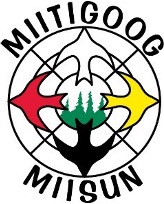
Watch a short 5-minute video to learn more about Miitigoog Limited Partnership and how SFI certification supports their sustainability goals.
“Miisun’s vision is to have sustainable forestry promoting continuing improvement. The boards give us clear direction on how they want the forest to be managed. And SFI just ties into perfectly, it’s about traditional values and incorporate First Nations values, and of course, following all the legal and social objectives as well.”
– Shannon Rawn R.P.F., General Manager, Miisun Integrated Resource Management Company
“The SFI Standard reinforces many of the objectives we currently have in managing our forests – protecting special sites, conservation, and community involvement. Through certification to SFI we can now communicate these important values to our customers and communities.”
– Chief Lorraine Cobiness, President of Miitigoog LP
SFI SMALL SCALE MODULE FOR INDIGENOUS PEOPLES AND FAMILIES
The SFI Small Scale Module for Indigenous Peoples and Families offers a pathway to SFI certification for individual forests or for a group of forests operating as a group under a single certificate. Both individual and co-certified forests require management plans that include long-term sustainable harvest levels and measures to avoid conversion to non-forest use.
Forests from 10 hectares to 20,000 hectares in area are eligible for certification under the module. The management plans will reflect the management goals, size of the forest and the scale of management operations. Larger forests will require an inventory upon which to base an assessment of the long-term sustainable harvest level and to permit planning and scheduling of harvest operations.
Smaller forests require a simpler management plan. Small-scale forest properties and forest licenses between 5,000 and 20,000 hectares must be under the management of a qualified resource professional or an individual that meets the legal requirements for conducting forest management for the jurisdiction. The forest management plan is based on sound forest management science and embodies the members or land manager’s current management goals.

The SFI Small Scale Forest Management Module for Indigenous Peoples and Families is best for First Nations, Indigenous communities, and Indigenous-led businesses located in Canada who operate individual small-scale forest properties OR co-operating groups of small-scale forests that are 20,000 hectares in total or less.
K’ÓMOKS FIRST NATION
The working forest of Rosewall Forest Tenure Holdings Ltd. is jointly managed by the K’ómoks First Nation and Qualicum First Nation. In 2018, the Nations collaborated with TimberWest to pilot the SFI Small-Scale Forest Management Module for Indigenous Peoples, Families, and Communities. Designed to reach smaller communities and elevate the benefits of well-managed forests through collaboration and conservation, the SFI Indigenous Peoples and Families Module includes measures to broaden practices to address the conservation of biodiversity, the use of forestry best management practices to protect water quality, soil productivity and reforestation, and the use of forest management and harvesting professionals.
“Obtaining SFI certification is a good long-term decision for the benefit of our community and the future generations that will be managing the forests in the years to come.”
— Nicole Rempel, Chief of the K’ómoks First Nation

SFI URBAN AND COMMUNITY FOREST SUSTAINABILITY STANDARD
SFI collaborated with five urban forestry leaders: American Forests, Arbor Day Foundation, the International Society of Arboriculture, the Society of Municipal Arborists, and Tree Canada to establish the SFI Urban and Community Forest Sustainability Standard.
Urban forests may include street trees, parks, wetlands, nature preserves, and more, in areas extending from an urban core to the urban-rural fringe. Community forests promote a participatory approach to forest management in which people in cities and towns manage areas of forest for a range of ecological, social, and economic values
Urban and community trees and forests provide many social and environmental benefits including:
- improved health and well-being
- opportunity for social connections and access to nature
- outdoor learning environments
- climate change solutions
- reduced air pollution
- green infrastructure and improved urban design
The SFI Urban and Community Forest Sustainability Standard is best for Indigenous communities and Indigenous-led businesses that manage trees located outside of forests, in urban areas, and/or for a values-based multidimensional approach to forest management (such as managing for cultural use, wildfire mitigation, biodiversity, community access and participation, etc.)
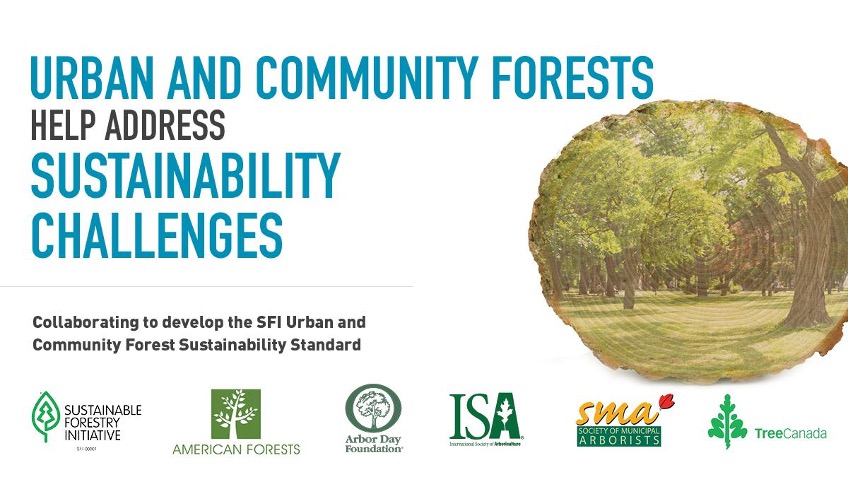
| Organization’s Goals | SFI 2022 Forest Management Standard | SFI Small Scale Forest Management Module for Indigenous Peoples and Families | SFI Urban and Community Forest Sustainability Standard |
|---|---|---|---|
| Most likely to be used by | Organizations that own or has management authority for significant area of forestlands where revenue generation or returns on investment are of paramount concern for either corporate, government or societal interests. | Those interested in a group certification approach and/or smaller-scale interests or families co-operating for the purposes of obtaining sustainable forest management certification. | Organizations that own, manage, or are responsible for urban and community forests including public forests licensed to communities by a province under a forest management agreement. |
| Size parameter | Productive forest area under management more than 20,000 hectares. | Productive forest under management less than 20,000 hectares. | No area limit but most likely these forests will be small or medium in size compared to large public tenures. |
| Manager holds a significant forest tenure from a provincial agency, or a large corporation or investor manages or owns the forest | ✓ | ✓ | |
| Revenue related to annual harvesting and regeneration of trees is a primary factor in decision-making | ✓ | ✓ | |
| Support for municipal green infrastructure | ✓ | ||
| Community decision making or priorities is the primary factor in management strategies | ✓ | ✓ | |
| Community health and well-being is the primary driver in SFM decision-making | ✓ | ✓ | |
| Recognize and Respect Indigenous Rights | ✓ | ✓ | ✓ |
| Manage for climate change mitigation/ adaptation on managed forests | ✓ | ✓ | ✓ |
| Protection and Maintenance of Water Resources | ✓ | ✓ | ✓ |
| Conservation of Biological Diversity | ✓ | ✓ | ✓ |
GRANTS AND RESOURCES
SFI recognizes that Indigenous communities themselves are best positioned to create the innovative forest-focused solutions that address the needs of today, while also building the lasting capacity to achieve their aspirations long into the future.
We strive to provide flexible, adaptive approaches to forest-focused community investment that respond to the evolving interests and priorities of our Indigenous community partners.
SFI offers three unique granting programs that offer diverse pathways to advancing the forest-focused collaborations around the issues that matter most to communities. Learn more about the different funding programs and discover which SFI Grant Program may be the best fit for you.
SFI COMMUNITY GRANTS
SFI Community Grants have supported projects that include traditional Indigenous knowledge transfer from elders to youth, monitoring and training to conserve culturally-important species like steelhead and marten, and educational field trips for youth to better understand the values and benefits provided by sustainably-managed forests.
For the shíshálh Nation, a series of SFI Community Grants have supported traditional educational opportunities for shíshálh Nation members to identify, conserve, and map cultural and medicinal plants.
The project was split into four phases between 2018 and 2020, wherein priority cultural and medicinal plant identification cards were developed by the shíshálh Nation Cultural Plants Team.

The project also supports sharing these cards with other forestry companies operating within the shíshálh swiya, or traditional territory. The culturally important plant cards are a tangible, community-created training resource that will enable field-based forestry personnel to more fully recognize and respect the shíshálh Nation’s traditional knowledge and relationships with the land.
The project has the potential to become an example of community collaboration and best practice to be replicated in other regions by supporting and promoting Indigenous values, while also improving the understanding of these values by forest professionals and other community groups.
Learn more about SFI Community Grants, including requirements and previous examples of projects at forests.org/communitygrants.
SFI CONSERVATION GRANTS
The Syilx People of the Okanagan Nation are a trans-boundary tribe separated by the border between Canada and the United States, and are comprised of seven member communities, including the Penticton Indian Band.
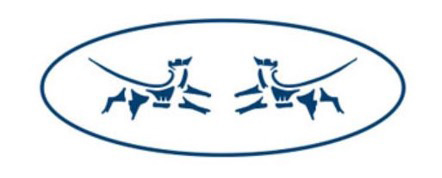
Supported by an SFI Conservation Grant, a recent project of the Penticton Indian Band is working to link Indigenous knowledge with scientific knowledge through enhanced riparian management.
The project collected empirical data and syilx cultural data on the relative health and abundance of syilx values and water quality parameters in streams (known as cecwixa in nsyilxcən) and their associated riparian areas in managed tenures when compared to other areas. The Penticton Indian Band also developed pre-harvest and post-harvest sampling procedures as part of the project.
The project will help forest managers and forestland owners understand how meeting the SFI Standard can support a variety of conservation objectives and facilitate meaningful collaboration. The Penticton Indian Band documented the project’s findings and shared via a webinar linking syilx Knowledge Keepers and syilx Nation resource managers with forest sector and government representatives to discuss the syilx forest standards, and syilx caretakership rights and responsibilities.
Learn more about SFI Conservation Grants, including requirements and previous examples of projects at forests.org/conservationgrants.
SFI EDUCATION GRANTS
Place-Based Education and Exposure to Green Careers
The Yakama Nation’s continued stewardship and management of natural resources relies on an educated, well-trained and motivated workforce. In an effort to develop and encourage tribal youth to pursue natural resources careers, the Pacific Education Institute partnered with Yakama Nation Tribal Forestry to provide staff and educators with Project Learning Tree workshops, forest tours and other hands-on experiences, access to educational resources, and opportunities for youth to investigate green career pathways that could help them stay in their community.
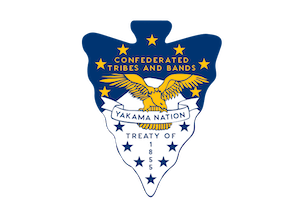
Learn more about SFI Education Grants by contacting SFI’s Senior Manager of Partnerships and Development, Rocco Saracina.
GREEN CAREER PATHWAYS
SFI believes that an investment in a young person’s future is an investment in an entire community’s future. Working with leading partners, we are committed to enhancing the number, relevancy and accessibility of education, training, and job opportunities for Indigenous youth within the forest sector.
Learn more about SFI’s Green Career Pathways programs and resources.
GREEN JOBS FUNDING
Since 2018, PLT Canada has invested over $2.7 million to help place over 1,000 Indigenous youth from more than 100 Indigenous communities in Green Jobs, many of whom found jobs in their own communities.
We offer a variety of wage matching programs to employers hiring Indigenous youth, ages 15-30, into green jobs that support nature-based solutions for a more sustainable planet. Many can be paired with equipment or accessibility funding, and pre-employment training supports, to further set Indigenous youth up for success in a green career pathway that’s right for them.
Indigenous communities, businesses and non-profit organizations are all eligible for Green Jobs funding.
Learn more about program eligibility current Green Jobs Funding opportunities by contacting the SFI Indigenous Relations Team or visiting pltcanada.org/en/employers.
LÍL̓WAT FORESTRY VENTURES LP’S STORY
Líl̓wat Forestry Ventures LP (LFV) is overseen by the Líl̓wat Nation. The organization’s work includes tree planting, spacing, brushing, slashing, falling, and road rehabilitation and construction. LFV also manages BC Hydro transmission slashing contracts, firefighting, fuels management and other tree service work. They are also responsible for managing training initiatives directly related to forestry and contracting.

LFV accessed PLT Canada’s wage matching funding to grow young adults’ skills and build the local workforce. Since 2018, they have hired 34 youth into PLT Canada-funded Green Jobs!
MENTORSHIP
PLT is proud to offer mentorship programs to help Indigenous youth advance their green career pathways.
The program connects youth (ages 18-30) with green jobs professionals using an industry-leading platform and algorithm that matches people based on their personalities, goals, interests, and more. This helps ensure that our mentor-mentee pairs build successful, productive and trusting relationships.
Learn more and PLT Canada’s Canadian Green Mentor Program as well as a brand new mentorship pathway in the United States.
EZRA’S STORY
Hear how one young mentee, Ezra Mecham of the Nuxalk Nation, found his way to the PLT Canada Green Mentor Program and connected with his mentor.
Ezra shares his experiences growing up in the remote community within the inlets of the Central Coast Regional District of British Columbia, and the many (sometimes surprising) benefits of connecting with a senior professional in the forestry sector. Read the article.
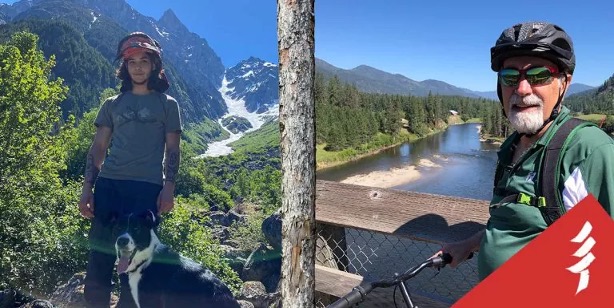
“The most valuable thing I have learned from my mentorship experience is the importance of a good mentor. I now see that the youth in my community who feel lost like I did need more positive role models, mentors who will do what my mentor has done for me.”
— Ezra Mecham
Join the PLT Canada Green Mentor program to expand your network and perspectives. Applications for the PLT Canada October 2023 cohort are now open!
A GUIDE TO GREEN JOBS IN CANADA: VOICES OF INDIGENOUS PROFESSIONALS
Download A Guide to Green Jobs in Canada: Voices of Indigenous Professionals, Project Learning Tree Canada’s (PLT Canada) 60-page booklet featuring first-person stories from 12 First Nations and Inuit leaders working in the forest and conservation and parks sectors across Canada. These Indigenous role models describe what inspired them to pursue green careers and share lessons learned from lived experiences. Available in Anishinaabemowin, Plains Cree, English, and French.
The guide also includes 12 career fact sheets that provide information on various jobs in forestry and conservation, including job descriptions, educational requirements, average salary, and examples of relevant educational programs available at college and university levels across Canada. The fact sheets help youth understand what is required to pursue similar careers to the professionals in the guide.
DEAN’S STORY
Following his desire to spend more time outdoors and near home, Dean Assinewe reconnected with the natural resources sector soon after graduating high school. Growing up part of Ontario’s Junior Ranger Program, he was inspired to earn a Forest Technician diploma, a Bachelor of Science in Forestry, and his certification as a Registered Professional Forester.
In the Guide to Green Jobs in Canada, Dean shares his tips for the next generation interested in a career in the forestry and conservation sector in the Guide, as well as his motivations, and what being Indigenous in a green career means to him.”

“If First Nations can help take a lead in how development happens, Canada and the rest of the world will be better for it. We have to draw careful connections between our environment, our culture. »
— Dean Assinewe
Read Dean’s story and those of 11 other Indigenous professionals in green careers across Canada with the Guide to Green Jobs in Canada: Voices of Indigenous Professionals.
VOICES OF INDIGENOUS YOUTH IN GREEN JOBS MAP
The Voices of Indigenous Youth interactive map highlights some of their stories and communities. They have all supported nature-based solutions through their Green Jobs. We hope that by sharing their stories, more Indigenous youth will be inspired to pursue a Green Job.
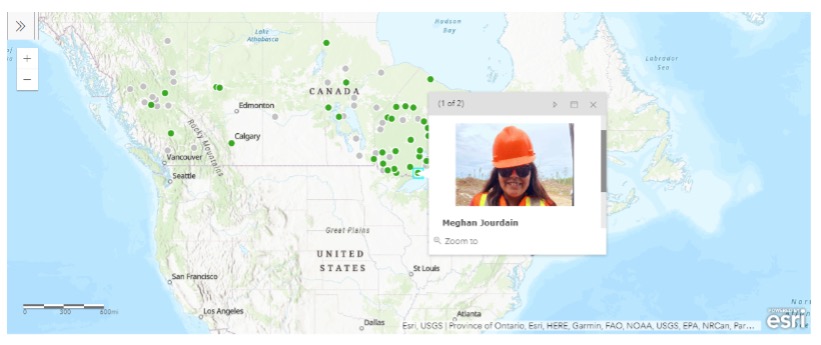
MEGHAN’S STORY
Meghan Jourdain, of the Fort William First Nation found green job experience with the Outland Youth Employment Program (OYEP), and she’ll be the first to tell you that her five years at OYEP were life-changing. Typically, her days would include tree planting, trail clearing and certification training. She now has professional experience as a Ranger, a Crew Leader in Training, and as a full Crew Leader.
“Without OYEP and the support of my community and all the people I met along the way, I would not be where I am today.”
— Meghan Jourdain
ADDITIONAL EDUCATION RESOURCES
A DAY IN THE LIFE: GREEN JOBS VIDEO SERIES
Ever wondered what a day in the life of a forester is like? An environmental educator? A biologist? We asked our network of Green Jobs professionals to film a typical day on their job to find out! Share PLT Canada’s “A Day in the Life” video series with young people to help them explore different green careers in forestry and conservation.
GREEN CAREER FACT SHEETS
Bookmark this downloadable free resource from PLT Canada that includes:
- 8 tips for successful networking
- Top 10 tips to create your resume
- Resume templates
- Cover letter checklists
- Tips for informational interviewing
- Identify your skills worksheet
WORKING FOR FORESTS
For communities in the United States, Project Learning Tree (PLT) has created the Explore Green Jobs: Working for Forests webpage to help anyone interested in a future career in forestry explore the many free resources available, including:
- The benefits of green jobs
- Downloadable fact sheets
- An interactive personality quiz with green career suggestions
- Plus much more!
CONNECT AND PARTNER WITH SFI
Working together is critical to ensuring the sustainability of our planet. Whether you are interested in certifying your forestlands, collaborating with SFI towards conservation or community grant projects, or furthering green careers, education or training programs in your community, SFI offers programs and services designed to advance communities’ forest-focused interests in ways that work best for them.
READY TO TAKE THE NEXT STEP?
Connect with us! There are many ways the Sustainable Forestry Initiative can partner with and support you. Please indicate your areas of interest in partnering with SFI by contacting a member of our Indigenous Relations Team or selecting the button below to use our Contact Form to learn more.
SFI INDIGENOUS PEOPLES AND FAMILIES MODULE
PLT CANADA WAGE MATCHING
INDIGENOUS RIGHTS AND RELATIONSHIP BUILDING EUNITS
SFI COMMUNITY GRANTS
SFI CONSERVATION GRANTS
MENTORSHIP UNITED STATES
MENTORSHIP CANADA
For forest certification questions, contact:
Ken Price, RFT
SFI Forest Certification Consultant for First Nations
For climate smart forestry questions, contact:
Jeffrey Ross
SFI Director of Indigenous Relations
208-410-0773
For all other inquiries, contact:
Elaina Cox
Indigenous Relations Coordinator
647-389-1171
FEATURED ARTICLE
FORGING A CAREER PATH IN THE FOREST SECTOR
(SE CONSTRUIRE UN PARCOURS DE CARRIÈRE DANS LE SECTEUR FORESTIER)
Pour quelqu’un qui a pratiquement grandi en forêt, je me suis rendu compte que j’avais une image folklorique et dépassée de la foresterie au Canada. Qui savait que c’était encore un choix de carrière?


